
About the Author
Ashley is a content writer at LovelySkin and a self-declared beauty junkie. She enjoys trying out new lip products and spoiling her pets.
Other Posts by AshleyWelcome to LovelySkin.com.
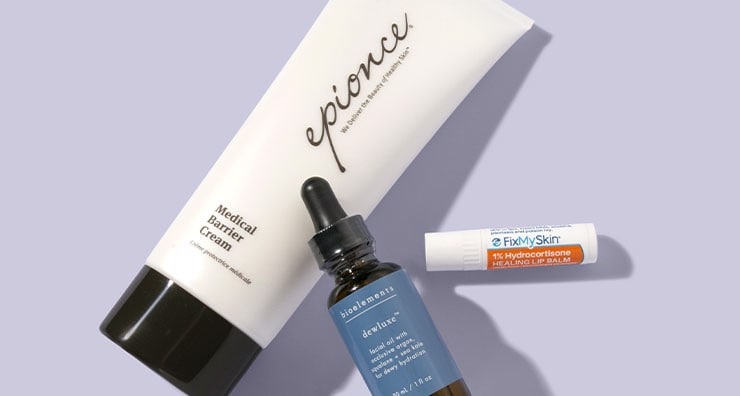
Have you ever dealt with acne scars or been curious about Accutane? Our Content and Social Media Specialist Ashley has first-hand experience with both, and she's here to share her journey with you.
I’ve dealt with acne my entire life. At the time of writing this, I’m in my twenties and I still experience it. Acne isn’t just for teens—it’s one of the most common skin conditions for people of all ages. With the help of my dermatologist, I decided to try Accutane to help improve my acne and acne scarring. I’m here to my journey with you and answer the questions you might have, including:
Ideal for moderate to severe acne and acne scarring that has failed other treatments, Accutane is a vitamin A derivative (like retinol) that’s designed to help clear up skin. It is considered one of the most effective acne treatments on the market today.
Accutane works by shrinking the sebaceous glands in the skin, which in turn reduces oil production. When oil production is reduced, it prevents clogged pores that cause blemishes. The drug comes in pill form and must be taken one to two times daily for up to six months. The dosage and the length of time you take it is determined by your height and weight, which is why it must be prescribed by your doctor.
Why should I take Accutane? Getting rid of acne and addressing acne scarring is a challenge. It takes a great skin care regimen, dedication, persistence and an excellent dermatologist. Luckily, here at LovelySkin, we have one on staff—board-certified dermatologist and our very own CEO Dr. Joel Schlessinger! Acne can be the result of a multitude of things like clogged pores, the foods you eat and even the natural bacteria on your skin. To properly treat acne, it’s important to see a dermatologist to determine its cause. From there, your doctor is equipped to help put together a treatment plan that will work best for you based on your skin and specific needs. My greatest concerns were persistent acne on my chin and jaw as well as bad acne scars on my cheeks. So, Dr. Schlessinger determined that some of my active acne was bacterial and put me on an antibiotic to clear it up. Next, he had me try LovelySkin LUXE Acne Care Gel to help improve the acne scars on my cheeks. After a month with only small improvements, Dr. Schlessinger determined a more aggressive approach would provide the best result. It was time to try Accutane.
One of the most-asked questions on this topic is, does Accutane help with scarring? To speak to that, I wanted to defer to Dr. Schlessinger himself. Here’s what he has to say about Accutane and acne scars: “Accutane is, without a doubt, the best potential treatment of all that exist for acne scarring. But—and it is a big 'but'—it must be started while the acne scarring is relatively new and still hasn't healed completely. The best chance for a dramatic and significant improvement in acne scarring is if the Accutane is used while the scars are reddish or early, but if they have been present for more than a year or so, the chances of success are less likely.
I always tell my patients that one course of Accutane is often better than hundreds of thousands of dollars of laser work later on in life. Sadly, many patients—or their parents, if they are not of age—decline to use Accutane out of fear of side effects, most of which are minimal, with the thought they will pay ‘whatever it takes' to get scarring to improve later on in life. That is the worst decision they could ever make, as Accutane has the potential to completely reverse or significantly improve acne scarring, while laser is—at best—only able to produce a 10-25% improvement. Sometimes, laser treatment isn't even able to yield that much of an improvement.
Even if Accutane is not used, there are sometimes standard treatments that result in improvement of scarring, but a trip to a board-certified dermatologist is the best plan when acne is present.
So, the take-home message is to treat acne early and before scarring is complete and the die is cast. Prevention is the best chance of cure.”
Accutane is an excellent option for those struggling with active acne, cystic acne or acne scarring. In my case, I had deep and persistent acne scars on my cheeks as a result of years of pimple popping and picking in my teens. This was the root of my problems: I had to stop popping pimples or I would cause more scarring. So before starting Accutane, I had to resolve to change my own habits.
When you can feel a pimple cropping up, Dr. Schlessinger recommends wetting a clean washcloth with warm water and pressing it onto your pimple for a minute or two. This will relieve some of the swelling and allow the pimple to come to head on its own.
Before I learned how to pop a pimple the right way (by the “right” way, I mean not at all), I tried every topical medication available—benzoyl peroxide, salicylic acid acne treatments, physical and chemical exfoliants, pore-clearing clay masks, facial cleansing brushes, common mail-order acne treatments—the works. While many of these products improved the acne I saw on the surface, they didn’t do much for my acne scars, and my skin was left red and inflamed. For this reason, Dr. Schlessinger decided that Accutane was the best course of action for me.
Many believe Accutane to be the ultimate cure for acne. While some take it and never experience acne again, that isn’t the case for everyone. For example, most Accutane users do not experience breakouts, but I experienced active acne the entire time I was taking it. So, it’s important to remember that although Accutane is not a cure for acne, it can greatly help.
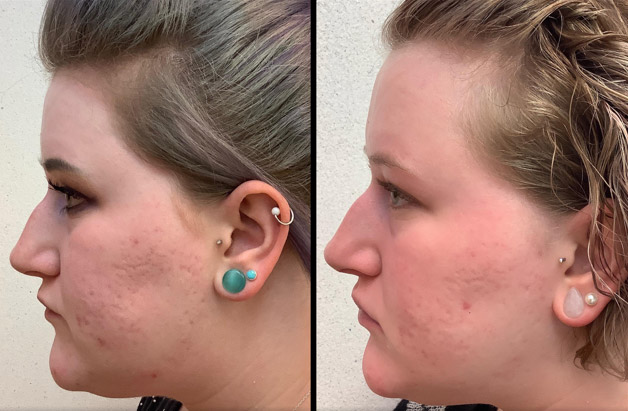
Left profile before and after six months of Isotretinoin.
Photos courtesy of Dr. Joel Schlessinger and Skin Specialists, P.C.
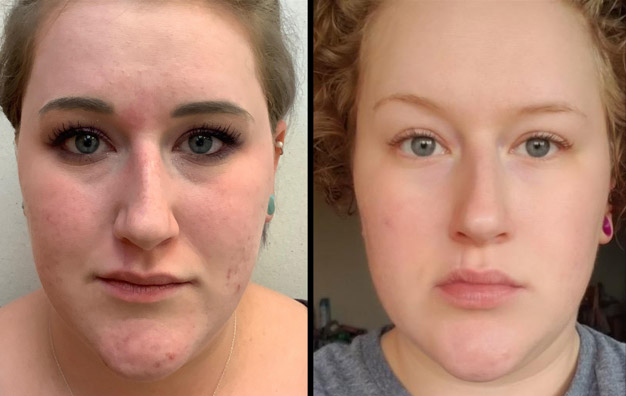
Forward-facing before and after six months of Isotretinoin.
Photos courtesy of Dr. Joel Schlessinger and Skin Specialists, P.C.
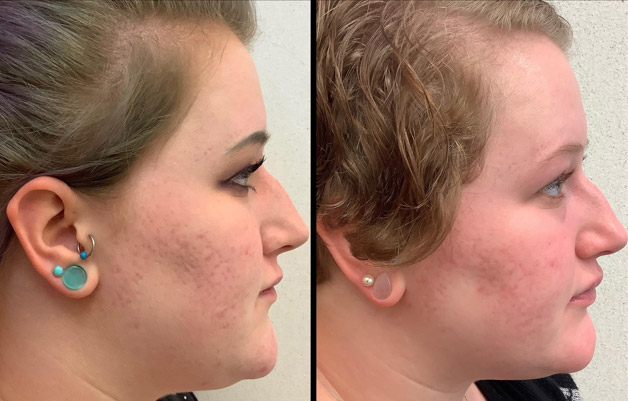
Right profile before and after six months of Isotretinoin.
Photos courtesy of Dr. Joel Schlessinger and Skin Specialists, P.C.
There are many side effects to taking Accutane, and it did get uncomfortable at times. That being said, I wouldn’t trade my experience for the world. I learned so much about my skin, and my results really kept me motivated!
Some of the side effects that I experienced and can be common for Accutane users included:
Due to the powerful nature of Accutane, side effects are to be expected. For those able to have children, monthly pregnancy tests are required as taking Accutane during pregnancy can lead to birth defects. Additionally, liver enzyme checks must be done every other month to ensure your liver is functioning normally.
While on Accutane, I struggled the most with how rapidly my skin changed. My skin became drier than ever before. Instead of focusing on acne treatments, I chose to use skincare products that supported skin hydration—and in doing so I learned that I’ve been caring for my skin wrong my whole life!
The foundation of a healthy complexion is hydration. Dry skin can lead to inflammation and even acne. First and foremost, I discovered that I needed to hydrate my skin below the surface before I could focus on the outer layers of my skin. In order to do so, I drank a LOT of water.
Once I was well hydrated from the inside, I could get started on the outside with a much-needed hydrator that could penetrate my skin deep enough to keep it nourished. One product I replied on was Epionce Medical Barrier Cream. Designed for application after dermatological procedures, this rich, creamy formula is designed to target damaged skin cells in an effort to restore hydration and soothe inflammation. I especially loved this product because I could use it from head to toe. For me, Accutane didn’t just dry out the skin on my face—it affected the skin on my entire body. Knowing that I only had to use one product for my entire body made the transition slightly easier.
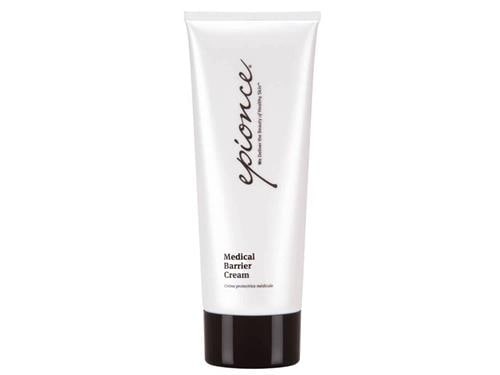
Another product that worked really well for me while on Accutane is Bioelements Dewluxe Facial Oil. This facial oil is meant to be applied after your moisturizer step, and I loved how it helped infuse my skin with lost moisture and fatty acids. It contains squalane, argan oil, sea kale and a blend of aromatic oils from ylang-ylang and passionfruit seeds.
Next, I needed a sunscreen. Sunscreen is essential for those on Accutane because your skin is so fragile. I usually prefer physical sunscreens made with zinc oxide and titanium dioxide, but these ingredients did not agree with my very dry skin.
Instead, I opted for a sunscreen that offered hydration—Dermalogica Prisma Protect SPF 30. Featuring a unique technology that works to attract moisture to the skin, this light-activated moisturizer provides protection against UV rays and damaging free radicals to help boost skin’s natural luminosity.
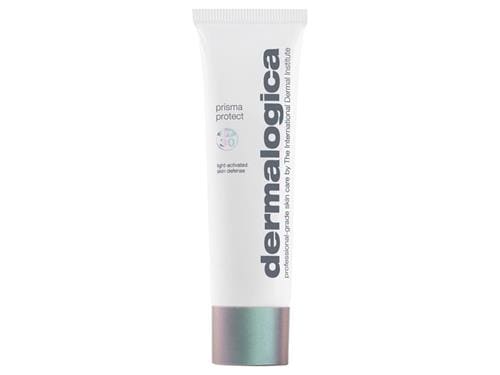
My final concern was keeping my lips hydrated. To keep the skin on my lips soft and healthy, I used FixMySkin 1% Hydrocortisone Healing Lip Balm – Vanilla before bed. It contains 1% hydrocortisone to help heal agitated skin as well as shea butter and cocoa butter for added hydration. Plus, it was formulated by Dr. Schlessinger and his son, Dr. Daniel Schlessinger, so I knew I could trust it!
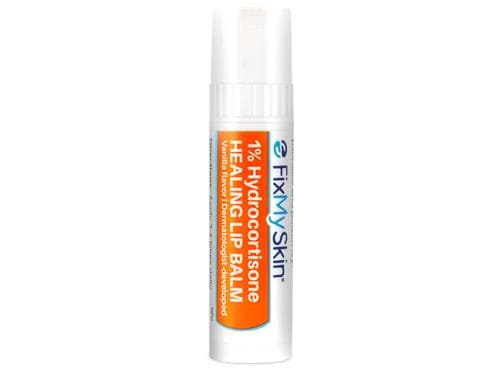
Finally, to counteract dryness and irritation throughout the day, I always kept a bottle of Avene Thermal Spring Water by my side. Infused with trace elements and minerals, this unique water helps soothe itchy, dry and irritated skin while also protecting your skin against free radical damage. It can be used on the face and body, making it a versatile product I couldn’t live without.
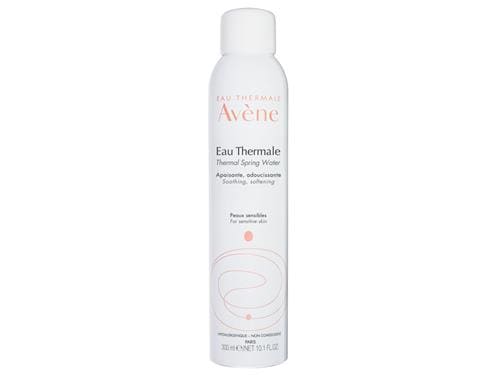
Short answer: yes. Long answer: proceed with caution. If you’re considering Accutane, know that it’s a long journey, but it can be worth it. After four to six months of taking Accutane orally, you will likely be transitioned to a prescription-strength retinol, but your skin will look amazing! In addition to the great results I saw, I’ve also learned how to properly hydrate and care for my skin, and that knowledge is something that will help me for the rest of my life.
Do you have a question about Accutane for Dr. Schlessinger? Let us know in the comments below!
The best acne and anti-aging skin care r...
How to treat swollen and peeling cuticle...
Follow us on social networks and be one of the first to learn about sales, giveaways, and free samples
| Mon - Fri | 9 - 5 p.m. CT |
|---|---|
| Sat (chat only) | 9 - 3 p.m. CT |
| Sun / Holidays | Closed |
| Call or Text: | 402-697-1100 |
|---|